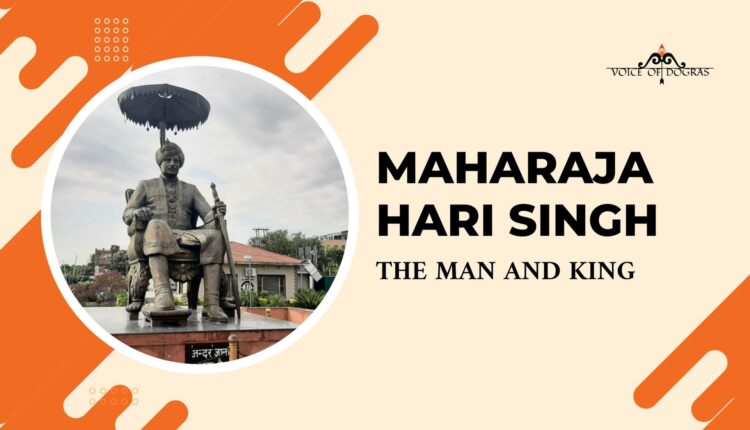September 23rd is the Punyatithi/birth anniversary of Maharaja Hari Singh, the last ruler of Jammu and Kashmir, whose royal title was Shriman “Indar Mahindar Rajrajeshwar Maharajadhiraj Shri Jammu Kashmir Naresh Tatha Tibet Deshadhipati”.
Maharaja Hari Singh was the last Dogra ruler of a dynasty which did the improbable task of holding together the state for a century. The Dogras created the state of Jammu and Kashmir which included Ladakh, Gilgit-Baltistan, Muzaffarabad-Mirpur, Aksai Chin and Saksham Valley with feudatories like Hunza and Nagar.
The Mighty Dogra Empire
It was one of the biggest kingdoms enjoying autonomy and internal sovereignty till 1947. Not only was the state a rich tapestry woven with multicultural, multilinguistic and multireligious threads, its far-reaching frontiers were evidence of its formidable military prowess, unparalleled in history.
A Princely state sharing borders with China, Afghanistan and Russia, remained undefeated in battle. The formidable martial traditions of the valiant Dogra race, saw them fighting battles at 15,000 feet at minus ten degrees temperature. They stretched the boundaries of the Country up to the Himalayas, the Northern most frontiers holding together a very diverse state by practicing the principle of one for all and all for one. Jammu Kashmir remained Independent in a Colonial India by sheer fortitude of its rulers and the qualities of courage, sacrifice and service of its people.
Maharaja Hari Singh – A Visionary:
Maharaja Hari Singh ascended to the throne in 1925. His reign was marked by complex political events, conspiracies, and sweeping changes which had the power to completely overwhelm a mere mortal but despite his inner turmoil he stood tall and stoically behind his kingdom, while taking some of the toughest decisions that no other king had to, before him. He was a progressive ruler, a man with a vision.
Educational Reforms:
The Maharaja was a great educationist, and his endeavours to promote literacy in the state were inclusive of women’s education. Primary and secondary education were free. Besides making primary education compulsory in 1930, a special department for female education under a deputy director was set up. His compulsory education policy saw the emergence of schools which the locals started calling ‘Jabran’ or forced schools.
Free conveyance was provided and staff would escort girls from home to school. Under the Maharaja a special drive against illiteracy achieved a lot of success with around 4,000 adult literacy centres functioning in the state.
During his reign the number of primary schools went up from 706 to 20,728 in Jammu and Kashmir. Steps like free education till matriculation, scholarships and grants for backward classes, nominal fees in colleges, and Urdu being added as a medium of instruction were in keeping with his vision of promoting literacy and higher education across a wide section of the people.
Health Reforms:
The Maharaja left behind a stellar best practice model as far as development of health care in the state was concerned. The state was once a pioneer in health care infrastructure, under the Maharaja’s rule. Jammu and Kashmir had one of the biggest hospitals in the subcontinent – the Maharaja Hari Singh Hospital in Srinagar The state also enjoyed the distinction of having the first tuberculosis department in the sub-continent. The number of hospitals, dispensaries, qualified and specialised staff were significantly increased during Maharaja Hari Singh’s times.
Social Reforms:
A social reformer who was ahead of his times Maharaja Hari Singh was courageous and was a champion of women’s emancipation. Maharaja Hari Singh stopped the rampant practice of child marriage and actively promoted widow re-marriage. He made trafficking and organised prostitution illegal. He was also successful in rooting out Sati.
Maharaja Hari Singh took bold steps against the practice of untouchability. He opened all public schools, colleges, and wells to the untouchables in 1931. The next year, all the state temples were also opened for them, lastly in 1940 he proclaimed untouchability a crime. His removal of legal disabilities on the marriages of Hindu widows, was regarded a doctrine in Sub-continent.
To prevent female infanticide, the Maharaja constituted two committees in 1926 and 1929, which recommended including educating the people and severe action against the guilty of the crime.
The Maharaja accepted both the recommendations
Economic Reforms:
The Maharaja paid special attention to tourism and handicrafts industry. Gulmarg and Pahalgam were developed in a planned manner and the number of tourists increased from 8604 in 1931-32 to 24,659 in 1936-37. Local enterprises were greatly encouraged and many manufacturing units were set up.
The infrastructure development that he initiated by building roads, bridges, tunnels, hydro power stations in addition to modern communication services like telephone, telegraph and wireless, lead to significant rise in industrial production.
In fact, increase in the volume of trade, though a boon for all, was especially beneficial for the Kashmiri Muslims who were primarily craftsmen and tradesmen. Brilliant agriculture reforms which changed the taxation system, land ownership and debt clauses, the abolition of begar and forced labour, all brought much relief to the agriculturists.
Administrative and Political Reforms:
Maharaja Hari Singh empowered village panchayats, which then were used to resolve community conflicts in village life. Department of Rural Development was established in 1937, the panchayats were also associated with the implementation of plans for rural development.
Maharaja Hari Singh endorsed the formation of a Legislative Assembly called the Jammu and Kashmir Praia Saha in 1934. The Praja Sabha which earlier declared as recommendatory body was consisted upon 75 members-12 government officials, 16 state councillors, and 14 nominated and 33 ejected members. The last were named categorically including with 21 Muslims, 10 Hindus and 2 Sikhs. The number of elected seats of the Praja Saba was increased from 33 to 40 in 1930 Its powers were also enhanced and non-official members were more closely associated with the state administration to work as under-secretaries. Praja Sabha was empowered to make laws for the state subjects, pass all legislation pertaining to the taxes as distinguished from fees and sing. ties, and to vole on the demands made by the government or budgetary allocations with the exceptions of a few non-voted bills.
Maharaja Hari Singh stood up for the values of equality, liberty and justice.
“Faiths should not be so weak that they be threatened by touch. Everyone’s God is the same and the differences have been fabricated by us” was something he often said. When overpowering ambitions of some individuals, coupled with British interference lead to political mischief, resulting in Hindu-Muslim riots, the Maharaja was shocked and deeply hurt.
Malika Pukhraj, the legendary songstress and one of the gems of Maharaja’s durbar was not only appointed as a court singer but it was an example of Maharaja’s progressive views on religion that he had her, a Muslim girl singing Bhajans in the Mandi Palace early morning alongside shloka chanting Pandits. In her autobiography Malika Pukhraj writes that Maharaja Hari Singh expressing his anguish said, “I have never differentiated between the Hindus and Muslims for the two communities are like my two eyes”.
Khusrau Jung, who belonged to the royal family of Hyderabad in the Deccan, was in the Maharaja’s employment. Malik and Nur Muhammad Khan from Baluchistan were his ADCs. Maharaja Hari Singh’s head cook and head waiter were also Muslims.
His secretary was Abdul Qaiyyum Khan and one of his close friends was Sardar Abdul Rahman Eftendi, an Afghan refugee related to King Amanulah. In his kitchens halal meat was cooked so that Muslims could eat as well. He was the first Maharaja of Jammu who went to the mosque, standing respectfully throughout the prayer.
After the prayer, he offered the imam who had led the prayers, Rs 500 and a pashmina robe. His progressive views on religion caused much displeasure to his Hindu subjects resulting in rumours that the Maharaja had converted to Islam on the sly. He remained indifferent to all such talk.
A man not keen on religious rituals, he did not discriminate between his Hindu and Muslim subjects. Indifferent to the opinions of his fellow co-religionists, he gave importance only to meritocracy and appointed the best of Muslims in his court, administration and the army.
A Hindu king who ruled over a Muslim majority state is how he is is often limitedly described, but it is only right in the context of current events to see how he rose above the communal stereotyping and stood by his words: “Justice is my religion”- his first statement after assuming the high office
Nationalist:
“As Indians and loyal to the land of our birth, we stand as solidly as the rest of the countrymen for our enjoyment of a position of honour and equality in the British Commonwealth”.
In a memorable speech in London in 1931-32 at the Round Table Conference on Indian on constitutional reforms, the Maharaja fearlessly demanded honour and equality for Mother India. This stance earned him the wrath of the British who unleashed a conspiracy against him which finally ended with him being the first high profile exile who died in Mumbai, far away from his beloved Jammu and Kashmir.
World Leader:
In 1914 Jammu Kashmir sent Kashmir Rifles to the Western Front the main strength of which was reinforced throughout the war. Another despatch of two battalions and two 2nd Kashmir Rifles was sent in 1917 increasing the total number of despatches to 1200 and 1070 strong. Two Kashmir Imperial Lancers 1915 and Kashmir Mountain Battery furnished with six guns 1916 largely added to the numerical strength of the war contribution. Total monetary contribution amounted to about Rs 1,1100,000. In addition to this the State supplied 31,000 recruits to the British Indian Army. This was the largest number of recruits supplied by any Indian Army. This was the largest number of recruits supplied by any Indian state during the war.
Yuvraj Hari Singh who was then the Commander in Chief made contributions from his Privy Purse. Investments in War Loans and bonds of Rs 13,00,000 plus other donations etc amounted to 2,91,000
The First World War saw nations who valued democratic principles stand up against fascist powers. By standing with Great Britain in this war the Dogras too, led by Maharaja Hari Singh served and sacrificed for a peaceful world order.
To Communicate the Truths of History is an Act of Hope for the Future
The Dogras assiduously built and held together the state of Jammu Kashmir. Through Maharaja Hari Singh’s efforts and those of the Dogra Kings before him and their Generals like Zorawar Singh, Bajh Singh and Brigadier Rajinder Singh, the state of Jammu Kashmir earned the title of ‘Sartaj e Hind’ Crowning Glory of India.
Learning by inquiry into the past, with an ability to sift through counter narratives objectively gives us the skills to deal with our present better. Though most historians have wronged Maharaja Hari Singh, more have now arisen to counter it, not in an attempt to seek a consensus, but because they believe that there are two sides to every story. One has been told and the other needs to be told. Maharaja Hari Singh’s legacy as a ruler of a vast and diverse kingdom who loved his land and all his people is something we need to know and learn from.


Comments are closed.